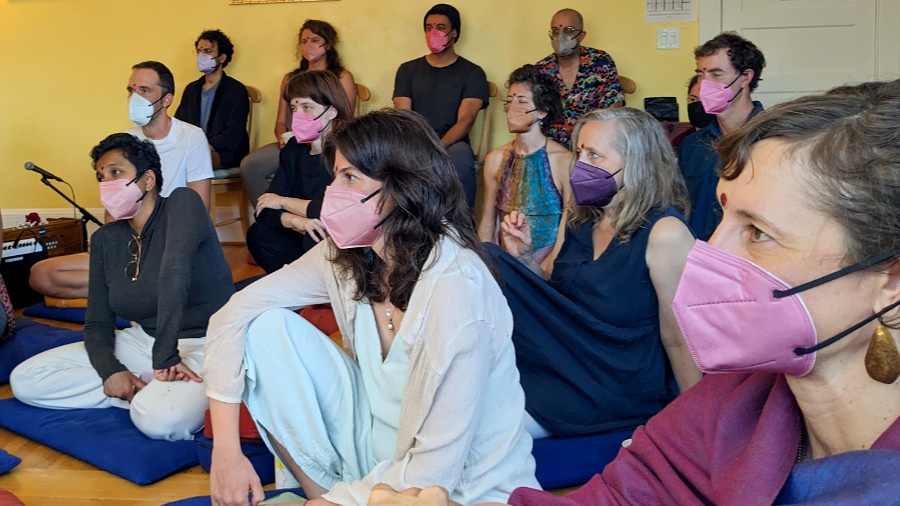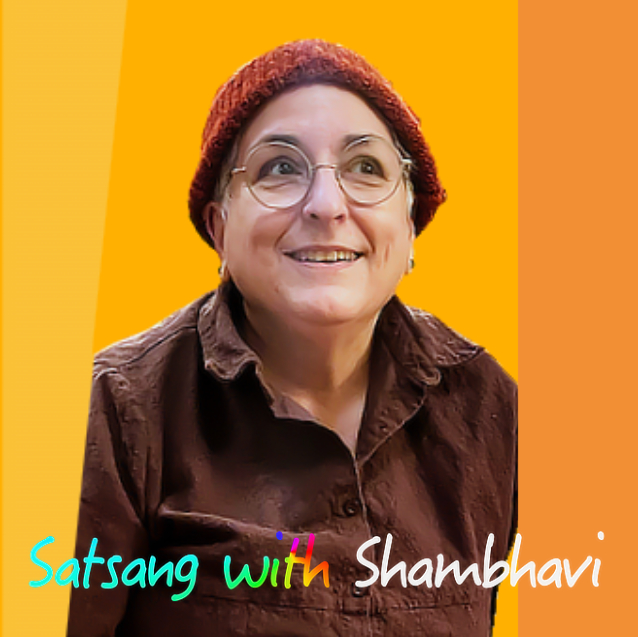The yearning we feel is grace and the presence of Guru. Plus, Shambhavi answers a question about aliens! A podcast from Satsang with Shambhavi
SHAMBHAVI
Hi, this is Shambhavi. Welcome to my weekly podcast about spirituality, love, death, devotion, and waking up while living in a messy world. The Satsang with Shambhavi podcast is recorded live each week with students of our nonprofit community, Jaya Kula. For more information and to find out about attending a satsang, visit jayakula.org. Thanks for listening. Much love to you wherever and however you are.
STUDENT 1
In the past, you've talked about how this form of life takes all of you, and all that you have to give. I'm wondering if you could talk more about that.
SHAMBHAVI
Well, of course, anyone can choose to practice in a compartmentalized partial way. So this isn't true of everyone who just happens to do 20 minutes of meditation a day.
I was speaking very personally about my situation, which is that ever since I can remember, I just wanted to be able to give what I had. I wanted to be used. That's how I thought of it.
And nothing I was involved in, my family or school or whatever, felt like it was really using all of me. It felt like something that had four cylinders that was only running on one cylinder. It just didn't feel good.
When I encountered this tradition, I just felt, ah, this is going to pull from me and ask from me everything. That's exactly what I want. This is the answer to what I have been asking for.
And so, what I mean is that—and I could never describe this fully, so this is just a bunch of words that point to something and only partially describe it.
But something that asks you to be working at the edge of your capacity almost all the time. Something that is limitless, that doesn't have an end. So that you never can finish with it.
So you're always being called upon to give more. To go deeper. To understand more finely. To refine your understanding. And that process doesn't complete.
And then the main way that it asks for your sensitivity and your senses? When you sit down and do practice, to be sensitive about what's happening in your body, energy, and mind. And to be able to follow that nuance.
And having always had somewhat of a nuanced experience of energy. And then having trained, really, since I was 15 years old, to feel subtle energy more. It's like my sadhana, or you could say God is a partner in that.
A partner that can communicate in the same way and with much more subtlety. It's like, meeting the subtlety of God calls for all your own subtlety. And then having to just try to see things clearly.
Reach for that open-heartedness, even when karmas are getting in the way. All of that requires all of your intelligence. All of your sensitivity. All of your virtue. All of your stamina.
And then, of course, being a teacher requires tremendous—it just is a tremendously big ask. Let's just put it that way. [laughs] And again, this is what I signed up for. This is what I want.
In fact, being a practitioner and also being a teacher is like really just there's nothing else that could be asked of me, really. I'm just giving everything I have to give.
And always sort of at the edge of what is possible for me, which I just love that. I love feeling that I'm just using everything. I'm participating fully.
I'm sharing what I have to give. That's what I always wanted to do. When I'm in situations where that's not possible, I'm not happy about that. [laughs]
That's the situation I grew up in. I grew up in a situation where people didn't really want what I had to give. And there wasn't really anyone to receive it. Or to play that game of subtlety with me.
So that's what I mean, personally. But of course, not very many people are doing practitioner in that way.
STUDENT 2
Can you talk a little bit about guru being—I think you said it in practice this week—like giving us the appearance of a path?
SHAMBHAVI
What I talk about in the morning practice is what's called guru tattva. So tattva means element. It means a component of reality. And what that means is an aspect of the self-expression of existence.
So these tattvas are modes of self-expression that create all the different possibilities for experiencing in duality. They're groups of expressions that create all the body, energy, and mind experiences that we have.
Guru tattva is the total package of all the possibilities of experiencing guru, basically. And so, all of those possibilities for experiencing something related to guru are things like lineages and traditions and practices and scriptures.
And the co-arising of teachers and students. Our own sense that life is a journey or a path, which almost everybody has. And it's sort of weird, if you step back from it a little bit.
You realize that, oh, okay, that's not actually necessary. It could be that we didn't have a sense of life as a journey or a path. But almost everyone on earth does have that sense.
Why do we have that sense? Because there's a natural process that's built into us. That is this unfolding toward more understanding of the nature of the self.
If our idea of the journey is very mundane, or it has to do with finding the love of my life, or it has to do with becoming emperor of the world, I don't know. [laughter] It's not necessarily that we have correctly identified what that yearning and that feeling of journey or path is really all about.
And we can have very many gradated experiences of that. From the most banal, to the most all-encompassing. And as we go along, if we're in that particular life, our sense of path widens out.
If we had no sense of a path or a journey of life, that there was somewhere to go and something to discover. And if we had no yearning to be on that path, no sense of that there's something missing. Something that I need to find out, something that I need to get.
If neither of those things were true, we would be nothing. I mean, we would just sit around and eat and poop and work and make more people. For no purpose. Nothing would ever change or develop.
That yearning and that sense of a path are the great motive forces, or engines of change in human life. And those are guru tattva. They're part of that bundle of things we call guru.
But just imagine if you had no sense of anything missing that you were looking for. And no desire to do that. And no sense of a journey. What would your life be?
You'd just be like, okay, I'll eat now. [laughter] Okay, now I'll go sit on the couch. It's like everything would be so disconnected and uninteresting.
STUDENT 3
Well, I've heard you talking about just a level of generosity of spirit around wanting to give to your students. Sometimes I would say to myself, I know too many people.
I really thought of you and I thought, Oh, my gosh, how does she handle all these people? I was very inspired by it.
SHAMBHAVI
Well, if you think of you and how you feel about having lots of people in your life. And if you think of me, how I am having lots of people in my life.
And then we think of Ma. She had tens of thousands of people in her life. So this is a natural progression. I could never be like Ma. In this lifetime, in many lifetimes.
I will never be able to handle the kind of constant breadth of what she was handling. She wasn't even handling it. To her, it didn't feel like handling.
But I will just never be like that. I will never have that capacity. I have maybe more capacity than you, but it's all on a continuum. And it's just a very natural continuum of how much of your energy is able to be freed up from self-concern, for other concern.
And how much your sense of separateness has eroded so that even other just feels more like aspects of self. And when that sense of separateness is more eroded, what happens is this is almost like a law of reality.
When that sense of separateness is more eroded, your own energy has more reconnected with the energy. The more open you get, the more porous you get, the less identified with little self. The more energy you have.
Because you're drawing on a bigger pool of the energy. You no longer have that embodied concept that it's just your energy. So there's more heart, more energy, more clarity.
Because you're drawing on the clarity, heart, and energy of God instead of just this little closed iPod. So that's why people like Ma just could stay up all night for nights on end, hardly slept.
Had thousands and tens of thousands of people that she was working with. Always being generous and loving. And never having to withdraw and cut herself off or establish particular boundaries.
Because she was being that reality much more fully than we are. Because we still have this sense of separateness happening, to some degree or another.
But I can tell you from my own experience that there's just so much more to draw on when the boundaries of the self start to come down. And so it doesn't feel like I have to be trained in some ordinary way to get used to it.
It's just a byproduct of doing sadhana. A natural byproduct. And then, of course, none of us are just this one lifetime. We're really, as one teacher of mine said, an infinite event.
And we all come in with different capacities, too. And we all have different capacities for how much relating we can tolerate. And how much we're having to put energy toward ourselves versus others.
And how much being in a certain more open-hearted condition is important to us, or not. All of those things are conditioned by whatever lives we're bringing into this life, too.
STUDENT 3
I always get, sometimes I still get zapped by this feeling like, I only have so much I can't give that much.
SHAMBHAVI
Well, that might be true, though. That might be a clear evaluation of where you're at and what energy you are drawing on. This is one thing no one should be doing is hearing the experience of the teacher and then thinking, okay, I'm going to try to be that way.
You have to understand that this is a very long process. I've been practicing now since I was 27. I'm now 65, and I was probably practicing in other lives.
So you've been practicing for five minutes. So, like, cut yourself a break and just recognize where you're at. And the way that we stretch ourselves is incrementally.
We try to be in the open heart more. But you can't play act enlightenment. You just have to start from where you are and go as fast as you go. And try to keep it very, very grounded and real.
STUDENT 4
From my understanding of it, the six realms is also a reflection of states we go through, maybe throughout day or through our lifetimes, all describing actual beings. Like an animal.
SHAMBHAVI
Right, exactly.
STUDENT 4
Does that also include experiences with aliens from other planets?
SHAMBHAVI
Do the six realms apply to aliens? Or do the six realms include aliens as realms? I'm not sure what you're asking.
STUDENT 4
I guess I'm asking both? [laughter]
SHAMBHAVI
Oh, ok. Well, I've never really met any aliens. [laughter]
STUDENT 5
Despite your efforts?
SHAMBHAVI
Despite my best efforts. [laughter] I have met beings from all six realms, but I haven't met any aliens. So I really can't answer that. But I can answer the question of, are the realm beings possibly aliens?
And the answer to that is no. I use a comparison between flat world and round world. So the flat world view is that it's a whizzy-wig world. It's what you see is what you get.
And someone who has flat world karmic vision thinks that there are only animals here and humans, and no other beings. And plants, maybe they include plants.
So if you have a flat world view, then someone tells you, Oh, the six realms, gods, and demons, and asuras, and hungry ghosts. What? Those aren't real beings, or maybe they're aliens. [laughter]
But those beings are all actually here with us. So there are beings here that have more subtle bodies or that we can't see with our ordinary vision. And they're inhabiting this realm with us.
They're very much of this place. And they're not aliens. They're just differently embodied beings. I don't know if that's what you're asking, but in any case, there's no seventh realm of alpha centurions or something.
The six realms actually come from—the beings of the six realms, are described in Indian, what are called the puranas. The literature of India that are spiritual teaching stories. Like the Mahabharata and the Ramayana.
Those beings all appear in those stories. Then they were codified or made into a system to understand the ways that humans get out of touch with living presence.
The different flavors. The different lenses that we put on the different karmic visions we have. And they also are real beings. They also are beings just like us. As real as we are, which I don't know how real we are, but.... [laughs]
Sign up to receive email updates
Enter your name and email address below and I'll send you periodic updates about the podcast.


